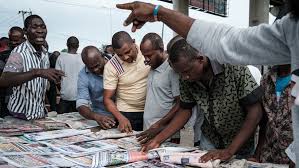The announcement by the Nigerian Government on Monday for the commencement of the 2024 oil bid rounds in accordance with the provisions of the Petroleum Industry Act is one of the trending stories in Nigerian newspapers on Tuesday.
The Punch reports that the Federal Government on Monday announced the commencement of the 2024 oil bid rounds in accordance with the provisions of the Petroleum Industry Act.
It announced this in Abuja at the first edition of the NEITI House Dialogue organised by the Nigerian Extractive Industries Transparency Initiative, where the Nigeria Upstream Petroleum Regulatory Commission also revealed that it made N4.34tn revenue in 2023.
Speaking at the event, the Chief Executive, NUPRC, Gbenga Komolafe, said the oil licensing rounds were designed to enhance quality data set and would be conducted in a fair, transparent and competitive bidding process in a non-discriminatory manner as stipulated on Sections 3 and 74 of the PIA.
“It is my pleasure to announce to you that the 2024 licensing round as prescribed in the Petroleum Industry Act will commence from the end of this month and we will be going offshore to market it as part of our job.
“Our job equally entails marketing of the nation’s hydrocarbon resources to prospective investors. So we are going to do that, and the process has commenced. We’ve set very clear criteria to guide the implementation of the process from the beginning to the end transparently,” he stated.
Asked to state the amount which the country would earn from the bid rounds, Komolafe replied, “The assets that are being put on offer are mostly greenfield assets, so they are virgin assets and so to accurately quantify the amount to be generated might be difficult since they are greenfield assets.”
The newspaper says that the Nigerian National Petroleum Company Limited on Monday began offloading 240 million litres of petrol, as it stepped up efforts to tackle the worsening nationwide petrol scarcity.
As the NNPCL began offloading petrol, filling stations sold the product at an average price of N800 per litre in various locations.
One of our correspondents gathered that the 240 million litres of petrol imported into the country came in through five vessels, which were offloaded into five depots on Monday.
The South-West Regional Coordinator of the Nigerian Midstream and Downstream Petroleum Regulatory Authority, Ayo Cardoso, confirmed this in an interview with The PUNCH on Monday.
The PUNCH reported on Monday that despite claims by the NNPC that the logistic issues causing fuel scarcity had been addressed, Nigerians in Lagos and other parts of the country still struggled to get fuel as many filling stations remained shut.
The PUNCH independently gathered that the situation might worsen in Lagos and other parts of the South-West because there was a directive by the NNPC that fuel trucks must first service the Federal Capital Territory before any other places.
According to oil sector sources, hundreds of trucks loaded were sent to Abuja on Sunday based on the NNPC directive.
Our correspondents who visited filling stations across the country on Monday observed that many outlets hiked their pump prices, selling a litre of petrol between N650 and over N1,000.
As the stations increased the pump prices of fuel, it was learnt that black marketers also used the opportunity to make brisk business, selling a litre of petrol at prices of over N1,200/litre, depending on the location and the bargaining strength of the buyer.
The Guardian newspaper reports that Human rights lawyer, Femi Falana, said the Federal Government was working in the interest of the International Monetary Fund (IMF) and the World Bank following a hike in electricity tariff.
Falana stated this in an interview on Channels Television’s Politics Today on Monday.
He said, “The Honourable Minister of Power is acting the script of the IMF and the World Bank.
“Those two agencies insisted and they continue to insist that the government of Nigeria must remove all subsidies. Fuel subsidy, electricity subsidy and what have you; all social services must be commercialised and priced beyond the reach of the majority of Nigerians.
“So, the government cannot afford to protect the interest of Nigerians where you are implementing the neoliberal policies of the Bretton Wood institutions.”
He accused Western countries led by the United States of America of double standards.
According to Falana, they subsidize agriculture, energy, and fuel and offer grants and loans to indigent students while they advise the Nigerian government against doing the same for its citizens.
Recall that the announcement of the tariff increase by the Minister of Power, Adebayo Adelabu was greeted by public outrage.
The newspaper says that the Nigerian currency, the Naira yesterday depreciated to N1,340 per dollar in the parallel market, from N1,300 per dollar last week Friday.
Similarly, the Naira depreciated in the Nigerian Foreign Exchange Market, NAFEM, to N1,419.11 per dollar.
Data from FMDQ showed that the indicative exchange rate for NAFEM rose to N1,419.11 per dollar from N1,339.23 per dollar last weekend, indicating N79.88 depreciation for the naira.
Consequently, the margin between the parallel market and NAFEM rates widened to N79.11 per dollar from N39.23 per dollar last week Friday.
GIK/APA


